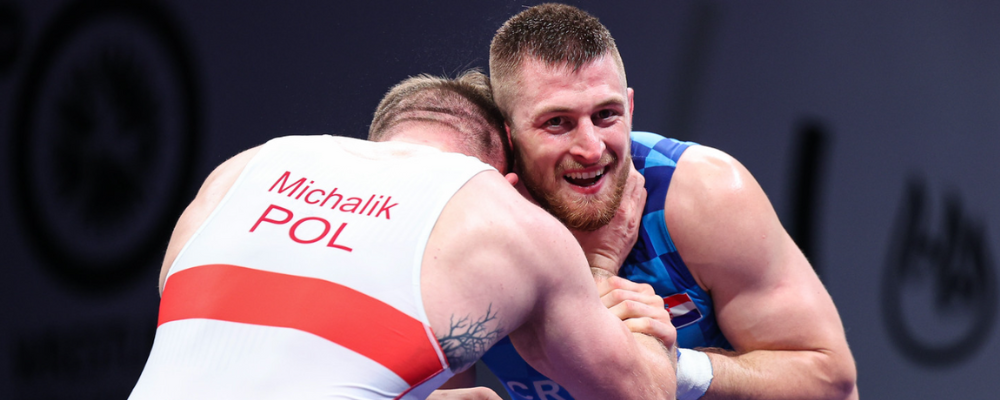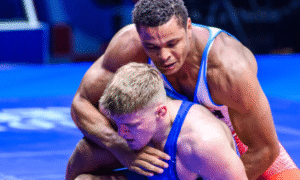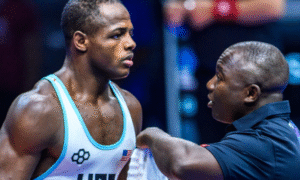Some might have seen Tadeusz Michalik‘s (POL) run to bronze at the Tokyo Olympics as a surprise, which defied logic. By August of 2021, Michalik was a long-established top Senior-level upper-weight who had twice placed 5th at the World Championships, including in ’19. That performance was how Michalik qualified 97 kg for Germany in Tokyo. But because the 97 bracket at the postponed ’21 Games was, perhaps, one of that event’s most loaded, few observers found it difficult to picture a pathway from which the brawling Polish wrestler might emerge to earn a podium spot.
Well, he did, and one of Michalik’s three victories in the tournament came at the expense of American G’Angelo Hancock — who in the match prior very well dominated multi-time World bronze Mikheil Kajaia (SRB). Hancock was without the same type of credentials on his resume as Kajaia but his victory over the Georgian-turned-Serbian was not exactly considered an upset. Hancock was simply that good, and when breaking down the match-up from a strictly stylistic perspective, the thought was that Hancock by and large had more weapons with which to defeat Kajaia than the other way around. As it happened, Hancock did not require a dazzling array of tools in order to send Kajaia packing. Their match was by and large devoid of suspense as the American cruised to a 5-1 decision thanks to a pair of gutwrenches from top par terre.
The quarterfinal pitting Hancock against Michalik carried similar connotations. The latter was considered a tough obstacle, but one Hancock would be able to clear. Didn’t unfold that way. Michalik — outgunned physically, athletically, and even technically — made the match as sloppy as all get-out. So covered in sweat were both wrestlers that they were practically slipping and sliding from one side of the tarp to the other. The whole scene was right in Michalik’s wheelhouse. Hancock struggled to weave in the tie-ups, and his normally-superb feet placement was compromised by both the surface upon which they rested as well as due to Michalik constantly spazzing out whenever meaningful static was achieved. It was just the type of match Michalik could win. It was probably the only way that Poland was going to have a chance against Hancock. And so, Michalik advanced, Hancock did not, and the matter was made all the more troubling because in the semifinal round awaited two-time World Champion Musa Evloev (RUS). No one in their right minds expected Poland to get past Evloev and pull Hancock back in the tournament via repechage. And he didn’t. The “Ginger Assassin” took a 7-1 decision over Michalik and eventually downed the great Artur Aleksanyan (ARM) to earn Olympic gold.
However, Michalik rebounded in the best way possible. He starched Alex Szoeke of Hungary in the bronze-medal round. At 30 years of age, Michalik had acquired the feather in his cap of which all wrestlers dream. He had become an Olympic medalist, a distinction that will precede his name in a sporting context throughout the remaining years of his life.
This past Thursday at the ’24 World Olympic Qualifier in Istanbul, Turkey, Michalik defeated Nitesh Nitesh of India in his first match but was edged by Filip Smetko (CRO) in the round-of-16. Smetko himself was ousted by Arvi Savolainen (FIN), which eliminated Michalik from the event and guaranteed that the Paris Olympiad would come and go without his participation.
Iakobi Kajaia (130 kg, GEO) had competed in the Rio Games, owned two medals from the European Championships, and placed 3rd at the World Championships leading into Tokyo ’21. Kajaia was certainly a viable contender in a crowded heavyweight field, he just was not one of the bracket’s most well-known names. In a weight class that featured legendary Mijain Lopez (CUB), ridiculously-decorated Riza Kayaalp (TUR), and two-time World champ Sergey Semenov (RUS), Kajaia was naturally overlooked by casual wrestling fans. Understandable, for the esteem in which Lopez and Kayaalp are held dwarfs most, if not all, other athletes.
Any anonymity surrounding Kajaia, in a mainstream wrestling sense, disappeared in Tokyo. He defeated Matti Kuosmanen of Finland, Semenov, and ’17 World bronze Yasmani Acosta Fernandez (CHI) to get a crack at Lopez in the final. Just sharing the mat with Lopez, who was in the process of trying to claim his 4th Olympic crown, elevated Kajaia’s status in a verifiable instant. Lopez won, of course; and every major news source worth its salt showered him with praise on account of the accomplishment as well as his age at the time of the event (39). Now Kajaia did not turn into a pumpkin in the wake of Tokyo. Three months later, he walked away with a bronze from the ’21 Oslo Worlds and last year earned bronze at the European Championships, his fourth career medal from the tournament.
But Kajaia was unable to place high enough at the ’23 World Championships to qualify 130 kg for Georgia in Paris; GEO then sent Sulkhan Buidze to the European Qualifier in March and he couldn’t get it done; therefore, it was up to Kajaia to take one last shot at the objective on Thursday in Istanbul. He was done after his first match. Kuosmanen, in fact, was the one responsible, and the monstrous Finnish athlete got run out of dodge in the proceeding round by young Belarusian dynamo Pavel Hlinchuk (who, like Kuosmanen, originally occupied 97 kg before moving up to 130). Hlinchuk’s destruction of Kuosmanen erased Kajaia’s bid for a bracket spot at the ’24 Olympics.
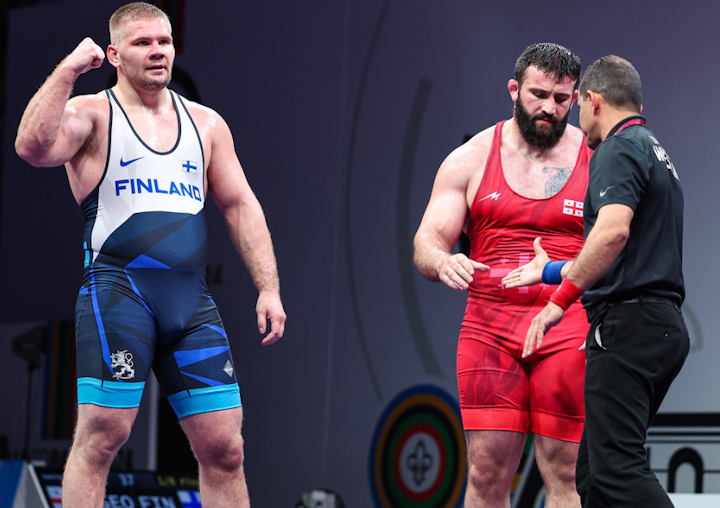
Olympic berths are awarded to countries, not athletes (which is why United World Wrestling’s “Qualified Athlete” cards given out this year were inaccurate, if not potentially heartbreaking for those wrestlers who secured quotas on behalf of their nations even though they themselves may not appear in Paris). However, often the same athletes who qualify are indeed the ones who receive the honor of competing. They also tend to be the same athletes who, through each year of their respective primes, many of us come to know, study, and appreciate, allowing for the opportunity to closely follow their careers and competitive results.
So, check this out:
— As mentioned, two Tokyo Olympic medalists (Michalik and Kajaia) were unable to qualify their weight classes this past week in Turkey.
— 15 previous World medalists likewise failed to qualify in Istanbul.
— In total, counting all five Olympic qualifying tournaments held in ’24 (four continental events plus the World OG event in Istanbul), over two dozen prior World/Olympic medalists failed to qualify weight classes for their nations.
And this, all of this, is what the majority of American wrestling fans still do not understand about international Greco-Roman competition — particularly regarding World-caliber events, and especially when it comes to qualifying for the Olympics. The endeavor is not an arduous challenge fraught with potential pitfalls solely for United States Greco wrestlers. It is that way for virtually every other wrestler, as well, even those who belong to “powerhouse” programs.
For example, reverse-engineer Kamal Bey‘s (77 kg, Army/WCAP) showing in Turkey. Each individual athlete is subject to their own customized journey in any given tournament but it pays to acknowledge the manner in which match-ups materialize. Bey’s side of the bracket included a World champion/multi-time medalist in Viktor Nemes (SRB), World bronze Ilie Cojocari (ROU), and Iuri Lomadze (GEO). Lomadze has not yet taken custody of a World medal, but he does have two from the European Championships.
Bey himself was paired with ’21 World silver Sergey Kutuzov (AIN) — that is three World medalists all residing within a few bracket slots of one another. In the opening round, after trying to defend and counter two lifts, Bey was rung up for interfering with Kutuzov’s legs. A review by the officials resulted in the match coming to an abrupt end. Kutuzov eventually advanced to the semifinal and decisioned Lomadze to qualify 77.
Meanwhile, Nemes defeated Cojocari and Antonio Kamenjasevic (CRO) before having his doors blown off by Lomadze in the quarterfinal. Of the three World medal winners on Bey’s side of the chart, only one earned a Paris berth and that man was Kutuzov.
In the end, all three Olympic tickets offered in Bey’s weight class at the World OG Qualifier went to athletes who had previously attained World Championship hardware: Kutuzov, Aik Mnatsakanian (BUL, two-time bronze), and Zoltan Levai (HUN, ’22 silver, and to whom Bey fell in the “Paris Olympic Playoff” following the American’s inspired comeback via repechage on Friday).
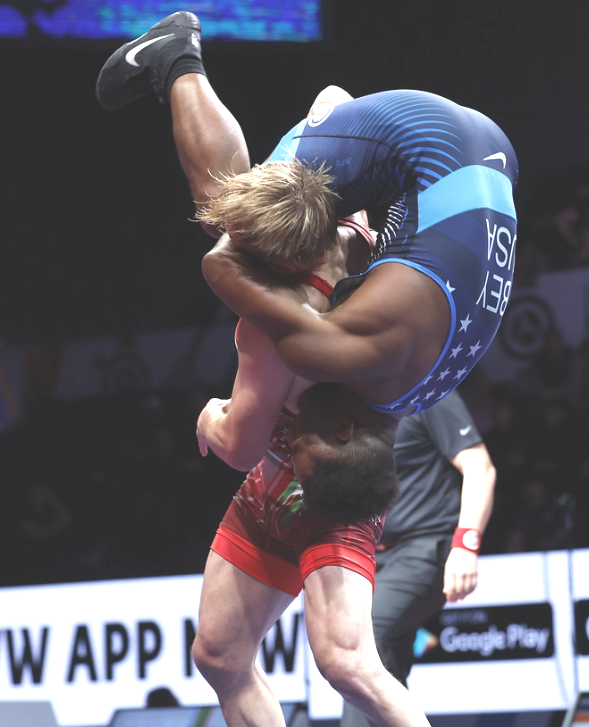
Two other countries with ties to this platform also departed from Turkey stung by disappointment. 5PM primarily serves the USA program but covers other national teams, too, with a special focus on Norway and Denmark.
Norway has an absolutely terrific roster, what with Felix Baldauf (97 kg), Oskar Marvik (130 kg), Morten Thoresen (67 kg), Haavard Joergensen (67 kg), Per-Anders Kure (77 kg), and Exauce Mukubu (87 kg). Thoresen and Baldauf both have earned European titles (’20 and ’17, respectively), Marvik owns a World bronze (’21), Joergensen placed 3rd at the Euros last year, and Mukubu triumphed to come away with U23 World gold in ’22.
There is not one ’24 Olympian among the group.
Denmark boasts Turbal Bisultanov (87 kg), who was a World finalist in ’22. Bisultanov — unquestionably one of the finest upper-weights in the sport — does not turn 23 years of age until October and is projected to contend for more medals consistently throughout the next decade.
That is likely of little to zero consolation to him at the moment. Bisultanov made it to the semifinal of the European Qualifier in early-April but tasted defeat at the hands of Alexander Komarov (SRB) in the “Olympic Games Qualification” round (semifinal). As such, he needed to make the trek to Istanbul this past week where he figured to be right in the mix at 87 kilos. He was. Bisultanov advanced to the semifinal (one more time, the “Olympic Games Qualification” round) but lost to Kyril Maskevich (AIN/BLR). He had one more chance after that and was downed 6-5 by ’21 Oslo bronze Arkadiusz Kulynycz (POL).
Everything about this is completely… normal. Every quad. Without fail. Greco-Roman athletes from across the globe whose talents are undeniable, and whose career ledgers are littered with tremendous accomplishments, come up short of qualifying for the Olympics. The only difference these days is that the number of entrants per bracket at the Games has been trimmed from 20 to 16, a reduction that began with ’20 Tokyo and will continue in Paris.
People in the US struggle to comprehend the grueling nature of this task. Not their fault. America might be a wonderful wrestling country — but it is also a spoiled, uneducated, ignorant, and tribalistic wrestling country. Fans and supporters of Team USA witness the dominance of men and women’s freestyle on a yearly basis. Can they be blamed for their confusion pertaining to the different challenges facing the Greco program? No, because it is in a bubble where they live and breathe. They grow up on folkstyle, and due to freestyle’s inevitable annual success they see both disciplines as one and the same. About this they are not entirely incorrect, for the variances between the two styles are subtle when compared to Greco-Roman. This segment of fans is, unfortunately, uneducated, as its occupants are without the knowledge of how much more popular and competitive Greco-Roman is elsewhere around the world. They are ignorant, as well, because they do not care to learn yet still wish to expound upon their opinions. As a result, American wrestling has become infected with tribalism, an infection that will no doubt spread in perpetuity until or unless the gap in knowledge with regards to the plight of the USA Greco-Roman program decreases exponentially.
Alas, that is a topic for a different day. We’ll get there.
For now, much more positive and productive is it to reflect upon the efforts of those from Team USA Greco-Roman who walked the walk in Istanbul. Dalton Roberts (60 kg, Army/WCAP), Ellis Coleman (67 kg, Army/WCAP), and Bey had just three weeks ago confirmed their entries into the World OG Qualifier after prevailing at the US Olympic Trials. They knew then what was waiting for them in Turkey. It was precisely what they wanted, and expected, and all three athletes competed with impressive courage and conviction in the face of daunting circumstances. It just didn’t work out for them this time.
But as we know, the same can be said for plenty of others.

Listen to “5PM57: Kamal Bey and David Stepanyan” on Spreaker.
Listen to “5PM56: Rich Carlson and Spencer Woods” on Spreaker.
SUBSCRIBE TO THE FIVE POINT MOVE PODCAST
iTunes | Stitcher | Spreaker | Google Play Music


